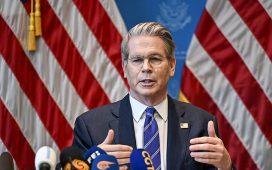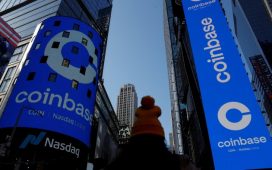
Carsten Koall/Getty Images News
“With rising geopolitical tensions and still-high inflation, a robust recovery remains elusive,” Kristalina Georgieva, managing director of the International Monetary Fund, said in a recent speech in Washington. That’s on top of the recent pressures in the banking sector that have made the global inflation fight that much more complex, she added.
Ahead of the IMF’s World Economic Outlook release this week, Georgieva called for global growth to remain around 3% over the next five years, marking the weakest medium-term growth projection since 1990 and well below the 3.8% average from the past two decades.
The sub-3% growth this year is generally consistent withg the 2.9% estimated in January and the 2.7% estimate in October.
Advanced economies are expected to weigh the most on global growth, particularly in the U.S. and Europe where rising borrowing costs have hampered demand. The IMF sees some 90% of advanced economies posting a decline in their growth rate in 2023. By contrast, emerging economies are a “bright spot” as India and China together are anticipated to account for 50% of this year’s global growth.
In referencing Russia’s invasion of Ukraine — an inflationary development — Georgieva said “this calamity not only kills innocent people, it also worsens the cost of living crisis and brings more hunger around the world. It risks wiping out the peace dividend we have enjoyed for the past three decades, adding also to frictions in trade and finance.”
The IMF head took note of central banks’ inflation fight in the wake of global banking issues, imploring “central banks to stay the course” in lowering inflation as long as financial pressures stay limited. Last month was one for the books as three U.S. regional lenders — Silicon Valley Bank (OTC:SIVBQ), Signature Bank (OTC:SBNY) , and Silvergate Capital (SI) — failed inside of just one week, and then troubled Swiss lender Credit Suisse (CS) was forced into a government-brokered takeover to avert further tumult in the sector.
While Georgieva implied that central banks should keep monetary policy restrictive until price stability is achieved, she also urged them to “address financial stability risks when they emerge through appropriate provision of liquidity. The key is to carefully monitor risks in banks and non-bank financial institutions, as well as weaknesses in sectors such as commercial real estate.”
If turmoil in the banking system worsened, however, she acknowledged that central banks may have to outright cut interest rates. On Thursday, JPMorgan Chase (JPM) Chairman and CEO Jamie Dimon told CNN in an interview that the banking stresses have boosted the odds of a recession in the U.S, a scenario that money markets appeared to be hedging for in recent weeks.
“Concerns remain about vulnerabilities that may be hidden, not just at banks but also non-banks — now is not the time for complacency,” Georgieva added.
Related ETFs: (EEM), (MCHI), (INDA), (INDL), (KBA), (IEUR), (EUFN), (IEUS), (IEMG), (MTUM), (USMV), (QUAL).










